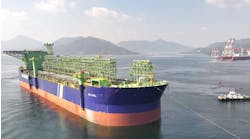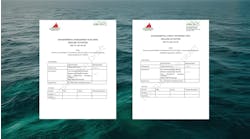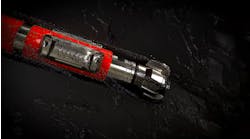Chariot licenses more offshore Morocco acreage, exits Mauritania permit
Offshore staff
LONDON– Morocco’s government has awarded Chariot Oil & Gas a 75% operated interest in the Mohammedia offshore exploration permits I-III.
Office National des Hydrocarbures et des Mines (ONHYM) holds a 25% carried interest.
The concessions are over a near-shore 4,600-sq km (1,776-sq mi) area in water depths below 500 m (1,640 ft). They are adjacent to Chariot’sRabat Deep offshore exploration permits, which Eni recently farmed into as operator.
The Mohammedia area contains various proven and potential play systems. Chariot had acquired roughly 375 sq km (145 sq mi) of 3D seismic in 2014 in the precursorMohammedia Reconnaissance license, identifying prospects in the Eo-Oligocene (EOP-1 and 2), Lower Cretaceous (LKP-1a,1b,2a, and 2b) and Jurassic (JP-2).
Prospective resources for individual prospects, as audited by Netherland Sewell and Associates, are in the range 50-289 MMbbl.
The Jurassic carbonate shelf-edge system that takes in the JP-1 prospect in Rabat Deep is thought to lie along the western margin of the Mohammedia permits.
According to Chariot, the carbonate shelf-edge appears to act as a structural control on the overlying Early Cretaceous shelf margin with the LKP prospects resulting from deposition of (interpreted) shallow-water deltaic clastics.
Both the Eo-Oligocene and Lower Cretaceous prospects have seismic attributes that could indicate hydrocarbons. Chariot will acquire 250 sq km (96.5 sq mi) of 3D seismic data over areas where the LKP prospects extend outside the current 3D seismic coverage.
There is little existing seismic over much of the Mohammedia area, so the company has also committed to acquire a minimum of 2,000 km (1,243 mi) of 2D data over the remainder of the license to identify the nature and extent of the play systems.
Both surveys will likely go ahead next year.
CEO Larry Bottomley said: “We also have the potential to realize additional de-risking of the petroleum system from the drilling of the JP-1 prospect in the neighboring Rabat Deep permits.”
Offshore Mauritania to the south, the company has decided not to enter into the first renewal phase of theC-19 license, after failing to attract a partner to co-fund an exploration well.
Chariot had acquired 3,500 sq km (1,351 sq mi) of 3D seismic, reprocessed legacy 2D data, and performed seabed coring to deliver an integrated analysis and evaluation of the hydrocarbon potential on the C-19 block.
The company considers the acreage to be prospective, but according to Bottomley: “While it is clearly disappointing, it is important that the company maintain discipline in the management of risk, allocation of capital, and in developing those parts of the portfolio likely to yield drilling opportunities.”
06/16/2016
Share your news withOffshore at [email protected]


